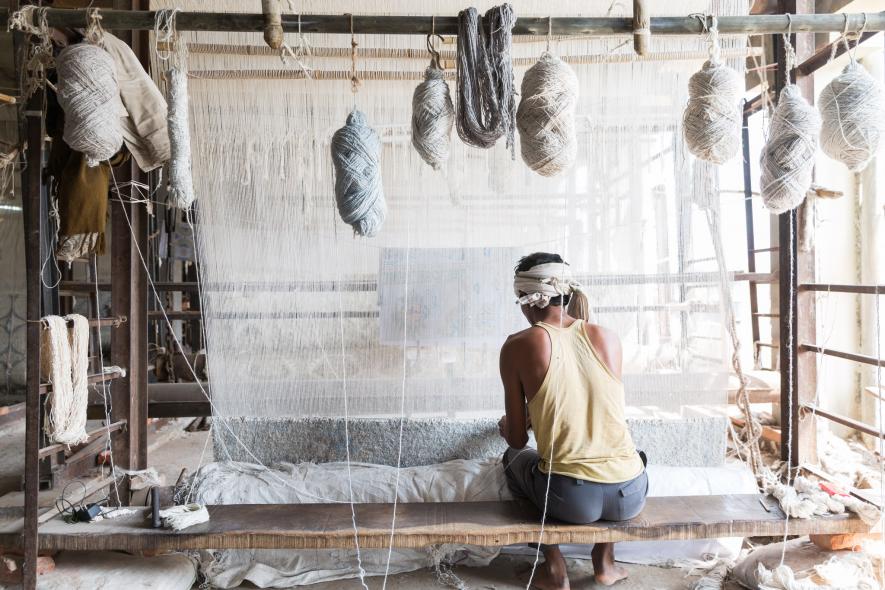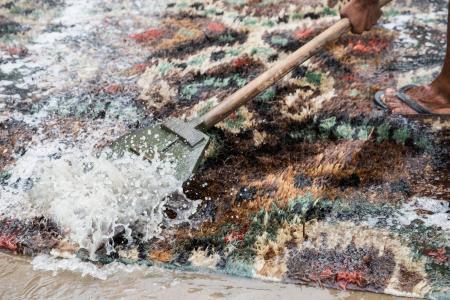UP: With Exports on Hold and Skilled Labourers Unlikely to Return, Carpet City of Bhadohi Grapples with Uncertainty

Photo Credit: Ansari Rug Bazar
Lucknow: Think of Bhadohi, and the one thing that immediately comes to mind are its carpets. However, not many will know that the city, about 16 kilometres away from Varanasi, employs 22 lakh rural artisans from across the country. And they have been hit hard by the lockdown due to the lockdown enforced because of COVID-19.
Once one reaches Bhadohi, a signboard saying ‘Kaleen Nagri Bhadohi main aapka swagat hai’ (welcome to the carpet city of Bhadohi) is hard to miss. This sleepy, semi-urban setting has a population of over 1.5 lakhs, both Hindus and Muslims, most of whom are engaged in the handmade carpet weaving industry. Manufactures said that the situation that exists is not the same as 47 days ago when the lockdown was imposed.
"The annual turnover of the carpet industry in India is estimated at close to Rs 12,500 crore per year and Bhadohi’s share is 60%. As per estimates, the industry has suffered a loss of not less than Rs 1,200 crore over the past one and half months,” said Imtiyaz Ahmad, owner of Textico – a leading exporter, manufacturer and supplier of hand-tufted carpets in the district. Ahmad told NewsClick that he alone had incurred a loss of Rs 55 crore.
According to the Carpet Export Promotion Council (CEPC), the industry's loss has been estimated at around Rs 3,000 crore so far and Uttar Pradesh accounted for Rs 1,300 crore alone.
"Ninety per cent of the carpets made in India are exported; 55% of total exports go to US buyers while 25% of the buyers are from European countries and these counties have mostly been affected due to the coronavirus. This will directly affect our exports," Siddharth Nath Singh, Chairman CEPC told NewsClick.
'Losing an identity'
The carpet making industry has been affected by the coronavirus pandemic like many others. Rugs and carpets are winter products and they are sold abroad between January and September. The months of March, April and May are peak season and orders are exported during the period. “This is the peak season to export our product to foreign counties but it is not happening. We are worried and our major concern is that if our product is taken out of the catalogues in foreign countries and places like China, Egypt, Pakistan and Turkey manage to get space, there could be a dent in business and Bhadohi will lose its identity," said Rizwan, a carpet manufacturer.
Bhadohi carpets draw admirers from across the world. It is believed that the craft was introduced to the area by Iranian travellers in the 16th century.
Javed, another prominent carpet manufacturer, said the government must ensure that they are protected. “In case the lockdown is extended for one month, this sector would not only become sick but a majority of the units would also dump their products," he said. "All the goods that are already prepared or the items that are being made will be there, intact, but our capital will be lost," he added.
Abdul Quavi, the owner of Ansari Rug Bazar, who has been weaving carpets on contract for buyers in Germany and other European countries, said that for the last three years, the carpet industry has faced aggressive international competition – especially from countries like China, Pakistan and Turkey.
Quavi said that India has been participating in the yearly DOMOTEX carpet fair which happens in January in Hannover, Germany. He said that manufacturers from Bhadohi tap potential buyers at the fair who come from across the globe. "We get enough orders on the spot and most of the orders are from Europe, the gulf countries, and the United States but due to the lockdown being extended, our industry is reeling under major losses,” he said.
Manpower Crunch
As the country gears up for a relaxation in the lockdown due to COVID-19, there are fears of a severe manpower shortage in the industries owing to the mass exodus of labourers to their respective villages.

The carpet makers are concerned about the fate of their industry as well, one which is heavily dependent on manpower and where a majority of the artisans are women. "The entire industry has handmade products known as Tana Bana (warp and weft) – hand movements made while running a handloom. Even making a low-quality product which is 5 feet by 8 feet (average size) in size takes between 15 and 20 days and it takes between two and six months for the same size in high quality. Most of the labourers have left for their homes and there is no hope that they would return to work soon.
Recently, the state government asked loom owners to screen workers before opening factories and make sure they wore masks and maintained social distance. However, the big worry for Imtiyaz is that more than 50% of their labour force are from Bihar, West Bengal, Odisha and Madhya Pradesh. Most of them have left for their hometowns and would probably not return to the carpet city. "The workers left Bhadohi on foot or preferred to ride their bicycles to their respective hometowns a week after the first phase of the lockdown. Though the Uttar Pradesh government allowed us to resume work with guidelines in place, the shortage of skilled workers is adversely impacting the business,” he said.
Several manufacturers that NewsClick spoke to said that with the lockdown in place, about 80% of the existing orders have been on hold for the past two months.
Get the latest reports & analysis with people's perspective on Protests, movements & deep analytical videos, discussions of the current affairs in your Telegram app. Subscribe to NewsClick's Telegram channel & get Real-Time updates on stories, as they get published on our website.
























